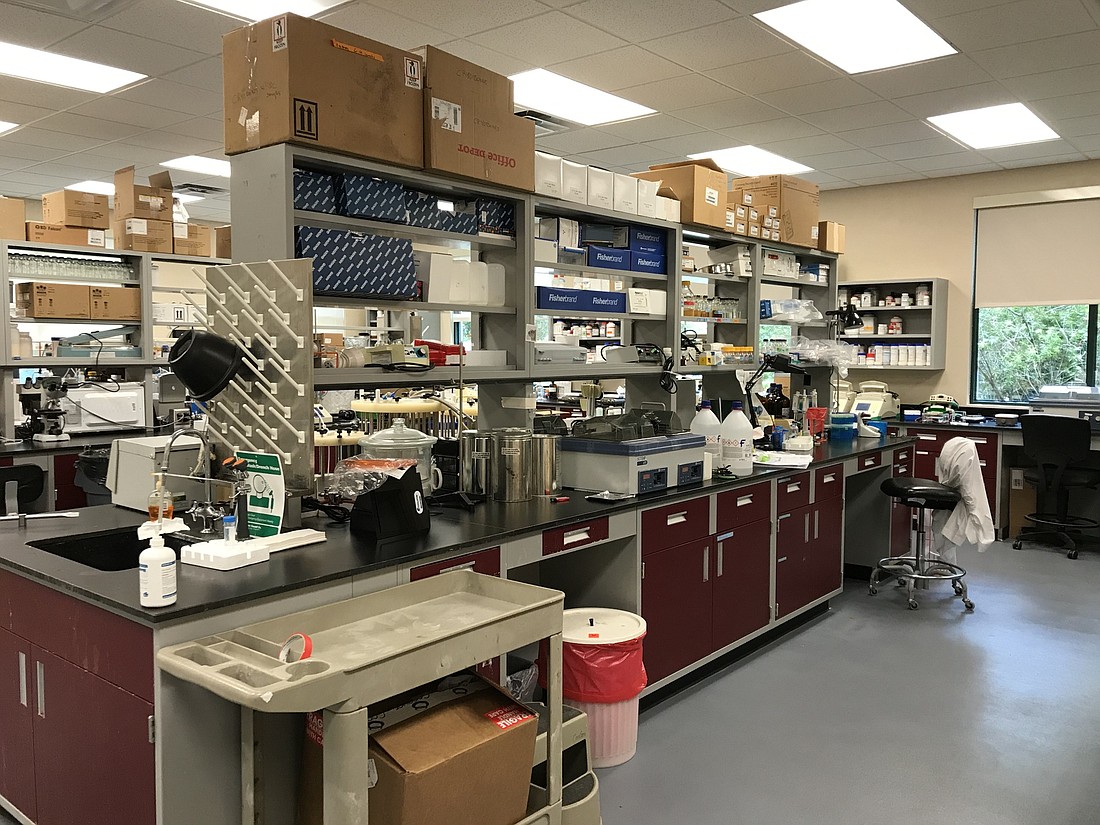- July 26, 2024
-
-
Loading

Loading

A Tampa biotechnology company seeks to be a major player in the Super Bowl of the pharmaceutical industry: a COVID-19 vaccine.
The firm, Tampa-based Oragenics, came to its vaccine candidate through an acquisition. In May, with the pandemic in its third month, the publicly traded company acquired Gainesville-based Noachis Terra. It paid $9.2 million in cash and $3 million in stock shares, for the company. Part of the deal — and part of the company’s appeal — included Noachis Terra’s worldwide, nonexclusive license for a COVID-19 vaccine candidate, TerraCoV2, from the National Institute of Allergy and Infectious Diseases, Oragenics CEO Alan Joslyn says.
Noachis Terra officials, in a statement a month before the acquisition, said development plans called for introducing the vaccine to the market within the next 18 to 21 months. The vaccine, officials add, is based on patent-pending technology designed to “generate a robust immune response with the potential for lifelong immunity from the currently circulating strain of coronavirus.”
Like many other startup bioscience firms chasing a big winning, breakthrough product or discovery, Oragenics has yet to generate any revenue. And in the hunt, the company, traded on the NYSE (symbol: OGEN) has posted more than $50 million in operating losses since 2017, public filings show. That includes a loss of $15.88 million in 2019 and $25.75 million over the past 12 months.
But the firm has enough potential to keep wooing investors. One big example: It recently raised $20 million through a stock sale, the company announced in a statement, and it also received $1.9 million by exercising common stock warrants. Joslyn, in the statement, says the firm seeks to raise an additional $5.6 million in another stock purchase.
The company’s shares, meanwhile, while still relatively low ($1.30 a share on Feb. 19) have more than doubled in value in 2021. Shares closed at $.45 a share Dec. 31 and were as high as $1.52 when the market closed Feb. 9.
Investors see what Joslyn and the Oragenics team sees: The vaccine market, led by industry titans that can spend billions on research and development, is obviously in demand right now. Two of those giants — Pfizer-BioNTech and Moderna — are behind the vaccines already approved for emergency usage in the U.S. A third industry leader, Johnson & Johnson, is poised to join those two soon with a single-dose option.
Joslyn knows this, and that’s why the company is focused on a different goal: making a single-dose vaccine as easy to use as possible. By the time an Oragenics vaccine will be ready, Joslyn hypothesizes that the priority will be on vaccinating second- and third-tier countries, controlling any hot spots that arise or working with patients who need booster shots.
“You need to have types of vaccines that are easy to administer and have long shelf lives at either refrigerated temperatures or even sitting on the shelf at a doctor’s office or a pharmacy,” Joslyn, 62, says. “That’s what we’re trying to do.”
Oragenics’ researchers, he adds, are looking at whether their product can be administered through the nose rather than the typical injection process that gives people yet another reason to be nervous about vaccines.
The biological make-up of the firm’s vaccine also differs from the synthetic messenger RNA found in Pfizer-BioNTech and Moderna’s products. That structure lends itself to the speed needed in a public health crisis, Joslyn says, but might not be the best long-term solution.
“Their technology is great because you can get out into the public very quickly, but the limitations are more on distribution and the longevity of storage,” Joslyn says. “They are great for a pandemic, where you’re trying to treat millions of people in a very short period of time.”
Oragenics’ vaccine, instead, uses what Joslyn calls a “more of a traditional approach.” The drug is currently in the preclinical stage of development, meaning it can be tested in animals but not humans. The company’s researchers are working with an entity in Southern California using a spike protein from Chinese hamster ovary cells. Preliminary trials testing the spike protein in mice showed immunity, the company says in a news release.
Oragenics was initially founded in 1996 by a doctorate researcher from the University of Florida’s College of Dentistry. The company’s focus was originally on oral health in humans and animals.
That was the focus in 2016, when Joslyn came on as CEO. The company had just acquired a product intended to prevent mouth ulcers in people undergoing chemotherapy. Clinical trials showed the drug was effective in treating the ulcers, but it didn’t actually prevent them, creating a much smaller market, Joslyn says. It was around the close of that clinical trial that Oragenics first began to consider acquiring Noachis Terra.
Moving forward, if Oragenics is able to develop a successful vaccine candidate, Joslyn says he will look to enter into a licensing agreement with another group that can market the product. Joslyn says that because much of the global government money for vaccines has already been awarded, companies like Oragenics will have to fund vaccines from investors. That won’t work for everyone.
“Not every company that has a good idea is going to be able to afford to go out into the marketplace and raise the significant amount of money required to advance a vaccine candidate,” Joslyn says. “A lot of good ideas could be left on the shelf because of lack of funding.”